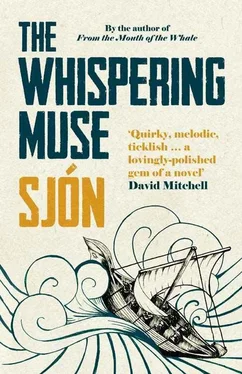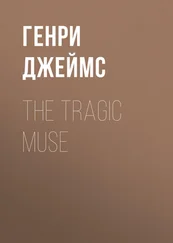He signalled to his men to turn back into the forest and they began to part the branches of the willow, preparing to vanish into the thicket again, but the woman said:
‘Wait! There’s a well nearby that’s used to water the horses when they’re grazing here in the old garden. The water’s fresh and full of invigorating minerals, since Mr TZ— loves his riding horses as if they were his own children.’
The man answered:
‘The Polish steed is a divine creature. What is good enough for him is good enough for us.’
‘Then I’ll show you the way.’
But because the well could not be seen from where they stood and the gouvernante wanted Opheltes to enjoy the sunshine in the lee of the willows, she laid him on the grass and told his sisters to keep an eye on their little brother for the brief time it would take her to escort the men to within sight of the well. The boy had just learnt to crawl and the moment his nurse turned her back on him he rolled over on his stomach and crawled laughing under a bush where Vipera ursini was waiting.
Although the venom of this European species of viper is not powerful enough to kill an adult, it brings certain death to any toddler it bites — and when the gouvernante returned to the sheltered spot, only a minute later, the little child Opheltes TZ— lay dead in a tangle of willow roots, and the snake had vanished.
When the thirsty friends of the fatherland saw the tragedy that had taken place, their leader said:
‘This is an ill omen for our expedition, and the boy’s true name should be Arkemoros: “Harbinger of Ruin”.’
Sure enough, all seven of them lost their lives in the attack on the fortress at Thebes.
The TZ— family nursed their vengeance until the end of the war, though they compelled the guilt-stricken gouvernante to serve them in every conceivable manner in the meantime. Afterwards they handed her over to a Soviet tank platoon that came raping and pillaging through the region.
Four years later the purser found the woman in a whorehouse in Königsberg. The day before he had acquired a leg of dried ham, and in exchange for this he was allowed to take the woman away with him.
I SHOULD THINK TODAY, Saturday 16 April, has been the most remarkable of the voyage so far. From early this morning till late this evening we have experienced one novelty after another. On the dot of six the rumbling and clanking began as every machine and winch on deck, fore and aft, ground into action as the loading was resumed with urgent haste. There was little chance of sleeping while this was going on so I got out of bed.
I put on my dressing gown and went out into the saloon, where I found the crew who had been turfed out of bed so that the loading of the ship could progress with all speed. Although the industriousness of the Norwegian dockers should have been cause for optimism, there was a subdued atmosphere among the deckhands at the breakfast table. Not that this was surprising. Many of them had caroused until nearly two in the morning and inevitably some had continued in their cabins, a few passing out in their bunks with a bottle tucked under their cheek — not that it bothered me.
What did come as a surprise was that the purser’s lady friend should say good morning to me. She seemed to do so on impulse, quite cheerfully. I returned the greeting dryly, though with perfect civility, and waited all through breakfast for the sting in the tail. But no, she merely finished her breakfast, took her leave of me in the same amiable manner and went off to start her chores; she had to work for two that day for, as she put it wittily, the purser was working in bed.
I was still scratching my head over the woman’s change of heart when the first engineer accosted me and invited me to go skiing with him. He had borrowed a car and planned to drive an hour or so up a fairly long valley to a place with ski slopes and a winter hotel for wealthy guests. There I would have a chance to try out something new, especially with regard to ski runs, with which he assumed I was little acquainted. He was sure we would be given a royal welcome at the hotel and had booked a table so we could lunch with the thirty other guests who were staying there. We could expect to sit down to eat with stockbrokers and politicians from Sweden and Norway, not to mention industrialists, ski-jumpers, actresses and shipping tycoons.
I patted the engineer on the shoulder, saying it was a kind invitation and a kind thought on the part of a fit young man to an old-timer, but unfortunately I didn’t feel I could accept. I was here as a guest of my benefactor Magnus Jung-Olsen and did not wish to abuse his hospitality by preferring a Norwegian ski hut to the fine amenities offered by the flagship of the Kronos line.
The engineer said he perfectly understood; he himself had never before sailed on such a well appointed ship as the MS Elizabet Jung-Olsen, although he couldn’t boast such princely quarters as I who lodged in two spacious cabins with an en-suite bathroom. And with that we parted company.

All afternoon I watched the loading of the ship. It was an impressive sight as the white blocks of raw paper came swooping over the ship like banks of cloud before descending with a loud whine into the hold. A young person would no doubt find this pastime a touch monotonous but I managed to see something new in every block. I watched the loading from various angles thanks to the solicitude of the deckhands who shifted me hither and thither around the deck so I wouldn’t be in any danger. There I stayed until the first mate came over and asked whether I would like to be his guest on the bridge, which afforded a good view of the operations, saying he would also like to take this chance to introduce me to the innovations in navigation equipment that were to be seen there, for at this point wartime inventions had begun to flood on to the general market — to the benefit of us all.
Yes, the ship was certainly well equipped and there had been many innovations since I rowed out to the fishing grounds with my father seventy years ago. The mate’s seat, for example, was a leather upholstered armchair, which could be tilted back and forth, spun in a circle or raised and lowered at will. Then there was the gallon-capacity coffee machine, divided into two compartments, which could also hold hot water for tea. It was bolted on to a waist-high hardwood cupboard in one corner of the wheelhouse, and let into the worktop beside it was a pewter tin full of English shortbread. The first engineer invited me to sit in the armchair, then brought me coffee and shortbread on a tray that he clipped to the right arm of the chair. And before leaving to attend to his duties he handed me a pair of binoculars and turned on the wireless: Turalleri, Pumpa lens and Hut la ti tei — Norwegian sailors’ ditties performed in poignant and heart-felt style by the much-loved Magnus Samuelsen.
However, the greatest pleasure for me was to see the blocks of raw paper gliding past the wheelhouse windows. Now that I was on a level with them I could see how far the raw product fell short of the quality book paper that was shortly destined to preserve the words of the Prophet or the speeches of Atatürk. With the help of the binoculars I could distinguish the discolouration of the half-worked pulp, for although the blocks had appeared snow-white from a distance, I now saw that they were shot through with bark-coloured fibres that sometimes had a greenish tinge. The best opportunity to examine this came when the workmen in the hold failed to keep up with their counterparts on shore, for then the block would stop swaying and hang still for a decent interval before my eyes.
Читать дальше













